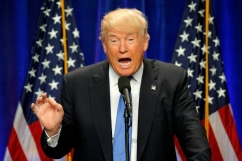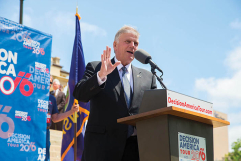The massed Muslim migrant hordes are gathering just across the Channel. If Britain leaves the EU we can cover the beaches with barbed wire again, like in the war, and keep them out. If we vote to Remain we'll have 12 million Turks on us before we know it, at least according to the Daily Express.
This is not an article about the EU referendum. It's about the fear generated in us by the thought of people who don't share our language, our culture or our faith coming to this country and changing it forever. And it's not about migration, either: it's just about the fear, and particularly the fear of Islam.

In the UK, generally speaking, it tends to be the lunatic fringe, like Britain First or UKIP's Christian Soldiers, that links resistance to immigration to fear of Islam. In public at least, the rhetoric is about population density and pressure on services, and these are perfectly valid and important questions.
In the US, the astonishing rise to political prominence of Donald Trump, with his commitment to ban all Muslim immigration into the country, has highlighted a far darker strain of public discourse. For a sizeable section of the population, Islam is the enemy. And at this week's Southern Baptist Convention meeting, that strain showed itself on the floor. One of the messengers, John Wofford, pastor of Armorel Baptist Church in Blytheville, Arkansas, took to task Russell Moore of the SBC's Ethics and Religious Liberty Commission, which had supported a New Jersey Islamic group's fight to build a mosque.
Wofford proposed a motion calling for the removal from office of SBC leaders who supported the right of Muslims to build mosques. He asked Moore: "I would like to how in the world someone in the Southern Baptist Convention can support defending the right of Muslims to construct mosques in the United States when these people threaten our very way of existence as Christians and Americans...Do you actually believe that if Jesus Christ were here today that he would support this and he would stand up and say, 'Well let us protect the rights of those Baal-worshipers to erect temples to Baal'? Do you believe that, Dr Moore?"
Moore's answer was both pithy and devastating. To the suggestion that the US government should take sides in a question of religion, he said: "You know, sometimes we have to deal with questions that are really complicated and we have to spend a lot of time thinking them through and we're not sure exactly what the final result is going to be. Sometimes we have really hard decisions to make. This isn't one of those things." The audience applauded.
Moore made the standard, and to a Baptist audience very obvious, arguments for religious freedom. If the government can close mosques it can close Baptist churches too. A religion imposed by government "does not turn people into Christians, that turns people into pretend Christians and it sends them straight to hell. The answer to Islam is not government power, the answer is the gospel of Jesus Christ and the new birth that comes from that."
Wofford's motion was ruled out of order, though it would have been defeated. However, he is not the only Southern Baptist to have queried the status of Islam in recent days. Gerald Harris, the editor of a prestigious Christian newspaper and a far more significant figure, had attacked Moore in similar terms a few days previously. Harris wrote: "While Muslims around the world and in our own country are shouting "Death to America" should we be defending their rights to build mosques, which often promote Sharia Law and become training grounds for radicalizing Muslims?"
Quoting approvingly from authors who questioned whether Islam was a religion at all rather than an idealogy aimed at global domination, he said: "Southern Baptists entities need to come to the defense of a geo-political movement that has basically set itself against Western Civilization? Even if Islam is a religion must we commit ourselves to fight for the religious freedom of a movement that aggressively militates against other religions?"
Harris' views were rebutted in a response by three Southern Baptist professors, who said it was "inappropriate to question whether Muslims should retain the right freely to practice their religion".
They continue: "Moreover, we believe any attempt to inhibit religious liberty will only prove to be a hindrance to reaching these precious men and women, created in God's image, with the saving gospel of Jesus Christ...we want religious freedom for all human beings, while there is still time before the day of final judgment."
In both the US and the UK there are serious and genuine arguments to be had about immigration, integration and social cohesion. But the debate within the SBC has highlighted something else: that for Christians, religious plurality is non-negotiable. Not just because it provides opportunities for evangelism, and not even because it prevents governments discriminating against Christians too. It is fundamental because it recognises the uniquely precious capacity of human beings to respond to God in their own way and in their own time, their inalienable freedom to choose, and even to choose wrongly.
The great temptation is to imagine that in order for someone to be fully British, or fully American, they have to fit a certain spiritual and cultural template. That's what drives the hatred at Trump rallies, chillingly documented in a series of tweets yesterday by journalist Jared Sexton. That's what drives Harris and Wofford. But Christians need to stand firm: whatever reasons we might have for wanting to keep out the people who so desperately want to come to the UK, their religion must not be one of them.
As the English Baptist Thomas Helwys wrote in 1612: "For men's religion to God is between God and themselves. The king shall not answer for it. Let them be heretics, Turks [Muslims], Jews, or whatsoever, it appertains not to the earthly power to punish them in the least measure."
Follow Mark Woods on Twitter: @RevMarkWoods
















